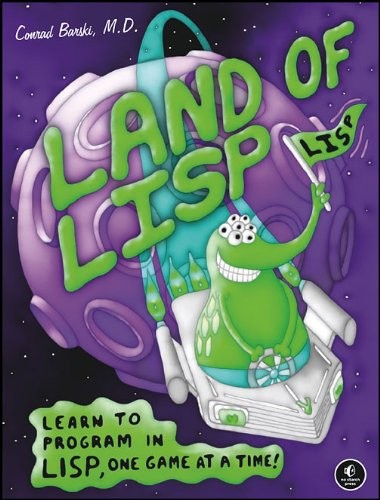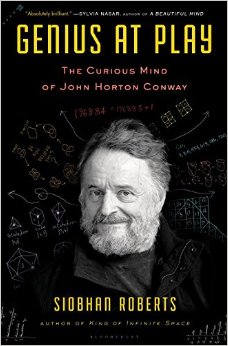Posts tagged "books":
Books read in 2025
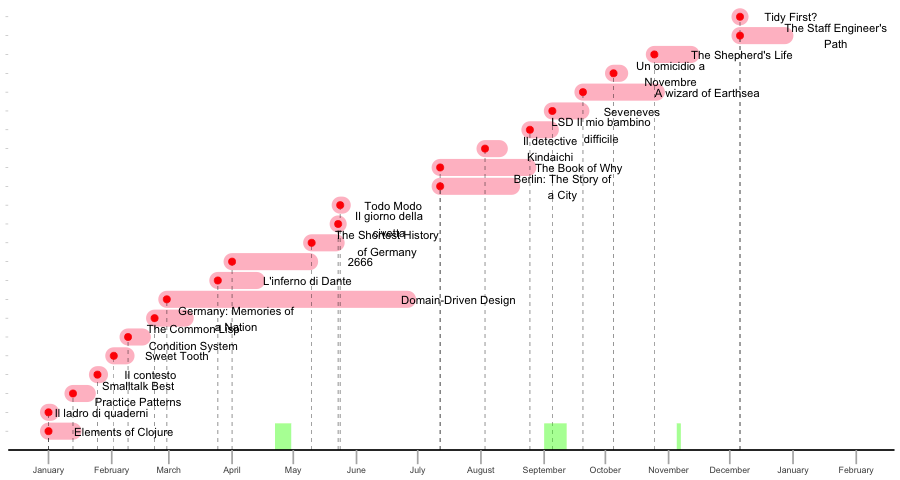
| Author | Title | Pages | Started | Finished | Category | |
|---|---|---|---|---|---|---|
| Zachary Tellman | ⭐ | Elements of Clojure | 119 | 2025-01-01 | 2025-01-13 | N |
| Gianni Solla | Il ladro di quaderni | 256 | 2025-01-01 | 2025-01-02 | F | |
| Kent Beck | ⭐ | Smalltalk Best Practice Patterns | 215 | 2025-01-13 | 2025-01-20 | N |
| Leonardo Sciascia | Il contesto | 114 | 2025-01-25 | 2025-01-26 | F | |
| Ian McEwan | Sweet Tooth | 370 | 2025-02-02 | 2025-02-08 | F | |
| Michał "phoe" Herda | The Common Lisp Condition System | 320 | 2025-02-09 | 2025-02-16 | N | |
| Neil MacGregor | Germany: Memories of a Nation | 563 | 2025-02-22 | 2025-03-09 | N | |
| Eric Evans | ⭐ | Domain-Driven Design | 560 | 2025-02-28 | 2025-06-26 | N |
| Vittorio Sermonti | L'inferno di Dante | 555 | 2025-03-25 | 2025-04-13 | N | |
| Roberto Bolaño | ⭐ | 2666 | 963 | 2025-04-01 | 2025-05-09 | F |
| James Hawes | The Shortest History of Germany | 227 | 2025-05-10 | 2025-05-22 | N | |
| Leonardo Sciascia | Il giorno della civetta | 137 | 2025-05-23 | 2025-05-23 | F | |
| Leonardo Sciascia | Todo Modo | 121 | 2025-05-24 | 2025-05-25 | F | |
| Judea Pearl, Dana Mackenzie | ⭐ | The Book of Why | 372 | 2025-07-12 | 2025-08-24 | N |
| Barney White-Spunner | ⭐ | Berlin: The Story of a City | 448 | 2025-07-12 | 2025-08-16 | N |
| Seishi Yokomizo | Il detective Kindaichi | 145 | 2025-08-03 | 2025-08-10 | F | |
| Albert Hofmann | LSD Il mio bambino difficile | 175 | 2025-08-25 | 2025-09-04 | N | |
| Neal Stephenson | Seveneves | 861 | 2025-09-05 | 2025-09-19 | F | |
| Simon Masoned | Un omicidio a Novembre | 382 | 2025-10-05 | 2025-10-08 | F | |
| Ursula K. Le Guin | A wizard of Earthsea | 167 | 2025-09-20 | 2025-10-26 | F | |
| James Rebanks | ⭐ | The Shepherd's Life | 287 | 2025-10-25 | 2025-11-12 | N |
| Kent Beck | Tidy First? | 92 | 2025-12-06 | 2025-12-06 | N | |
| Tanya Reilly | The Staff Engineer's Path | 311 | 2025-12-06 | 2025-12-28 | N | |
| 7760 |
(⭐ marks books I particularly liked)
Books read in 2024
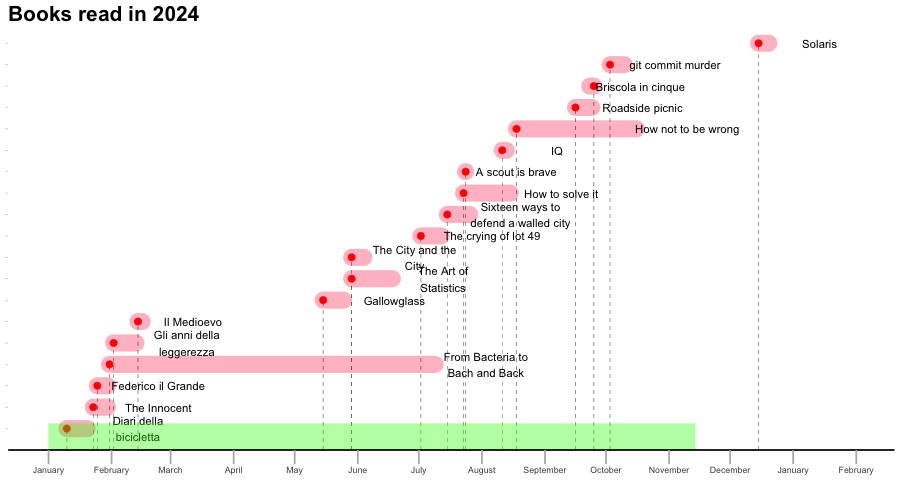
| Author | Title | Pages | Started | Finished | Category |
|---|---|---|---|---|---|
| David Byrne | Diari della bicicletta | 382 | 2024-01-10 | 2024-01-20 | N |
| Ian McEwan | The Innocent | 226 | 2024-01-23 | 2024-01-30 | F |
| Alessandro Barbero | Federico il Grande | 172 | 2024-01-25 | 2024-01-30 | N |
| Elizabeth Jane Howard | Gli anni della leggerezza | 600 | 2024-02-02 | 2024-02-13 | F |
| Jacques Le Goff | Il Medioevo | 126 | 2024-02-14 | 2024-02-16 | N |
| Daniel C. Dennett | From Bacteria to Bach and Back | 496 | 2024-01-31 | 2024-07-09 | N |
| S.J. Morden | Gallowglass | 373 | 2024-05-15 | 2024-05-25 | F |
| David Spiegelhalter | The Art of Statistics | 380 | 2024-05-29 | 2024-06-18 | N |
| China Miéville | The City and the City | 372 | 2024-05-29 | 2024-06-04 | F |
| Thomas Pynchon | The crying of lot 49 | 142 | 2024-07-02 | 2024-07-12 | F |
| K.J. Parker | Sixteen ways to defend a walled city | 350 | 2024-07-15 | 2024-07-26 | F |
| Will Ludwigsen | A scout is brave | 158 | 2024-07-24 | 2024-07-24 | F |
| George Polya | How to solve it | 253 | 2024-07-23 | 2024-08-15 | N |
| Joe Ide | IQ | 336 | 2024-08-11 | 2024-08-13 | F |
| Jordan Ellenberg | How not to be wrong | 437 | 2024-08-18 | 2024-10-16 | N |
| Arkady & Boris Strugatsky | Roadside picnic | 193 | 2024-09-16 | 2024-09-24 | F |
| Marco Malvaldi | Briscola in cinque | 163 | 2024-09-25 | 2024-09-23 | F |
| Michael Warren Douglas | git commit murder | 263 | 2024-10-03 | 2024-10-10 | F |
| Stanislaw Lem | Solaris | 256 | 2024-12-15 | 2024-12-20 | F |
| 5678 |
A snippet for LibraryThing
A very short one, to extract book titles from the widget "Your list" on the right, in a format suitable to paste in a Org document. Unfortunately I could not find an API endpoint to do the same thing in a more structured way.
$$('ol#list_yourlist li a').forEach( book => console.log('[[' + book.href + '][' + book.textContent + ']]'))
Alfred Wainwright
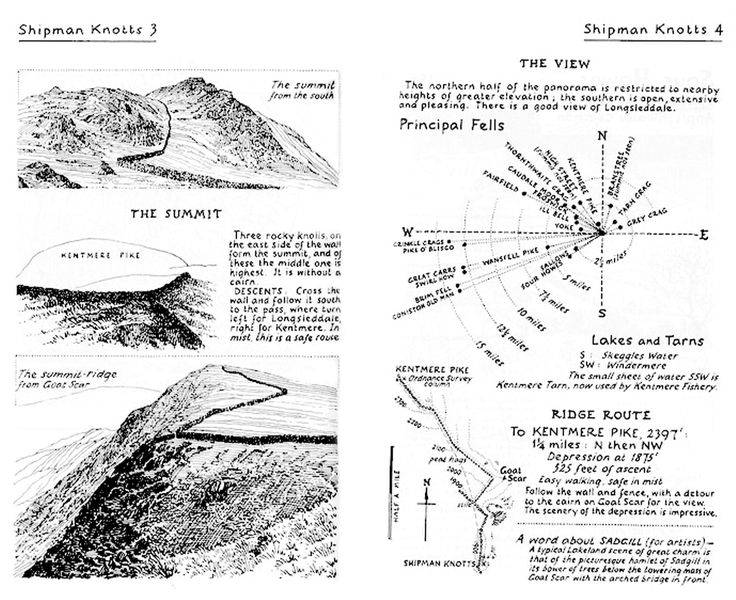
A Pictorial Guide to the Lakeland Fells is a series of seven books by A. Wainwright, detailing the fells (the local word for hills and mountains) of the Lake District in northwest England. Written over a period of 13 years from 1952, they consist entirely of reproductions of Wainwright's manuscript, hand-produced in pen and ink with no typeset material.
Books I finished in 2019
Novels
Other books
- Through the Language Glass: Why the World Looks Different in Other Languages
- Radical Focus: Achieving Your Most Important Goals with Objectives and Key Results
- Seven Brief Lessons on Physics
- The Manager's Path: A Guide for Tech Leaders Navigating Growth and Change
- The Computer Boys Take Over: Computers, Programmers, and the Politics of Technical Expertise
- UNIX: A History and a Memoir
Books batch
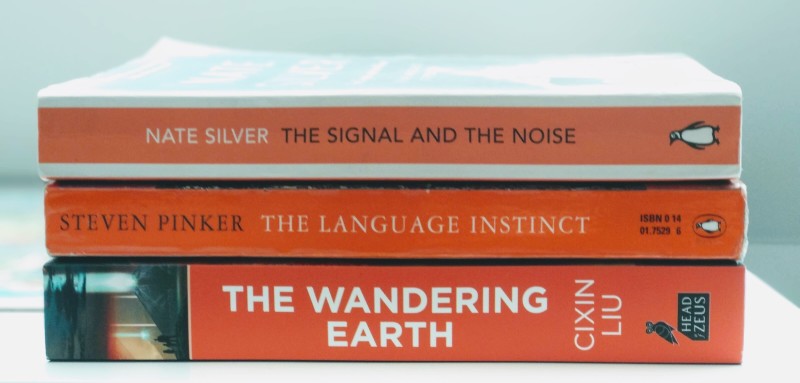
- Nate Silver's The Signal and the Noise
- The Language Instinct by Steven Pinker
- The Wandering Earth by Cixin Liu. I heard about Cixin Liu for the first time when he was nominated for the Hugo Awards, but never tried reading anything. This one is ideal, as it is a collection of shorter novellas.
Latest batch
Latest loot from the used-book store.
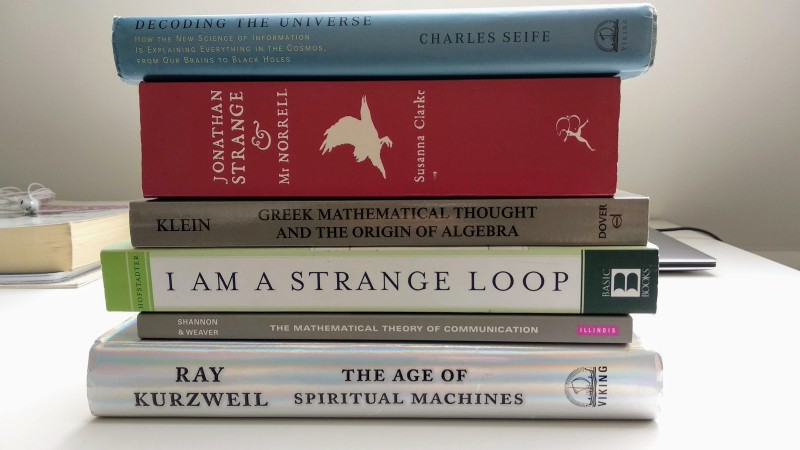
- Jonathan Strange & Mr.Norrell was repeteadly recommended by colleagues. Years ago, when the book was published and gained attention and success, I somehow didn't notice: I have only a vague idea about the subject and the plot, so I'm excited about what I'm about to discover.
- I took Greek Mathematical thought and the origins of Algebra largely because of a casual conversation I recently had about mathematical formalism and its history. I had only sketchy ideas about the subject, so I thought this one could be useful reference material.
- I am curious about Decoding the Universe (let's see if the book can hold up to the hype of that subtitle)
- The Mathematical Theory of Communication is a classic, picking it up was an easy decision.
- I have never read anything by Ray Kurzweil so when I saw this The Age of Spiritual Machines I put it on my pile without hesitation.
- For quite opposite reasons, but with the same effect, I grabbed this copy of I am a strange loop
Melvin Decimal System stats on LibraryThing
I just noticed LibraryThing released a new feature.
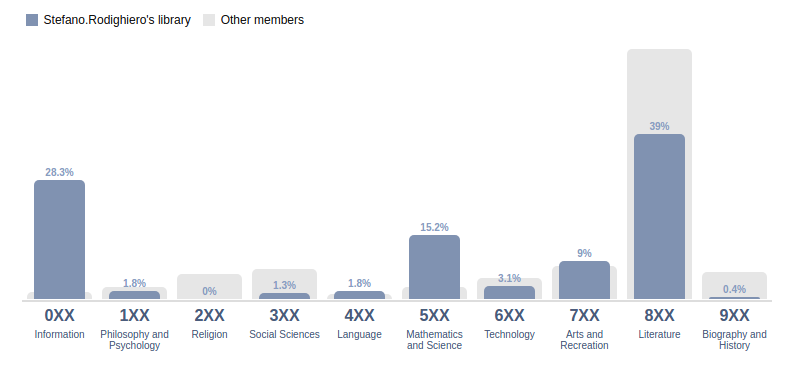
The Rise and Fall of D.O.D.O.

I started reading last Neal Stephenson's (and Nicole Galland's) novel. I'm only a few dozen pages into the book: it's soon to tell but it seems to be less "hard" SF than then other things I read from Stephenson. We'll see.
Mindstorms
Seymour Papert’s Mindstorms was published by Basic Books in 1980, and outlines his vision of children using computers as instruments for learning. A second edition, with new Forewords by John Sculley and Carol Sperry, was published in 1993. The book remains as relevant now as when first published almost forty years ago.
The Media Lab is grateful to Seymour Papert’s family for allowing us to post the text here. We invite you to add your comments and reflections.
Status update
Some days off, not very much done. Somehow relevant in the context of this stream:
- Writing some simple Common Lisp, for exercise. The Wireworld simulator and editor –which has some significance per se besides being interesting as a CL exercise– is on pause (while I try to figure out Lispbuilder-sdl's ways of treating surfaces), and I'm now on something simpler. It's a Sudoku solver assistant. It's not clear to me what the scope of the project will be, however I'm discovering handy techniques and tools useful for a "real" system: for example I borrowed from scmutils the idea of using TeX to obtain a representation of the Sudoku problem (it's faster than I initially thought).
- Reading Seveneves by Neal Stephenson. I hope to write something more substantial as I reach its end.
Alan Kay's reading list
(reproducing it here for archive)
| category | title | authors |
|---|---|---|
| Technology & Media | The Gutenberg Galaxy: The Making of Typographic Man | Marshall Mcluhan |
| Technology & Media | Understanding Media | Marshall Mcluhan |
| Technology & Media | The Myth of the Machine | Lewis Mumford |
| Technology & Media | Technics and Civilization | Lewis Mumford |
| Technology & Media | Technology, Management,and Society | Peter Drucker |
| Technology & Media | Innovation and Entrepreneurship | Peter Drucker |
| Technology & Media | Amusing Ourselves to Death: Public Discourse in the Age of Show Business | Neil Postman |
| Technology & Media | The Disappearance of Childhood | Neil Postman |
| Technology & Media | Conscientious Objections | Neil Postman |
| Learning & Creativity | The Psycology of the Child | Jean Piaget |
| Learning & Creativity | To Understand is to Invent | Jean Piaget |
| Learning & Creativity | Thought and Language | Lev Vygotsky |
| Learning & Creativity | To Understand Is to Invent | Lev Vygotsky |
| Learning & Creativity | The Psychology of Art | Lev Vygotsky |
| Learning & Creativity | Towards a Theory of Instruction | Jerome Bruner |
| Learning & Creativity | The Relevance of Education | Jerome Bruner |
| Learning & Creativity | Instead of Education: Ways to Help People do Things Better | John Holt |
| Learning & Creativity | Teach Your Own | John Holt |
| Learning & Creativity | Essays into Literacy | Frank Smith |
| Learning & Creativity | Lateral Thinking: A Textbook of Creativity | Edward De Bono |
| Learning & Creativity | Six Thinking Hats | Edward De Bono |
| Learning & Creativity | The Inner Game of Tennis | Tim Gallwey |
| Learning & Creativity | Nurtured by Love: The Classic Approach to Talent Education | Shinichi Suzuki |
| Learning & Creativity | The Secret of Childhood | Maria Montessori |
| Learning & Creativity | The School and Society | John Dewey |
| Learning & Creativity | Freedom and Culture | John Dewey |
| Learning & Creativity | The Act of Creation: A Study of the Conscious and Unconscious in Science and Art | Arthur Koestler |
| Learning & Creativity | The Ghost in the Machine | Arthur Koestler |
| Learning & Creativity | Mindstorms | Seymour Papert |
| Learning & Creativity | The Childrens' Machine | Seymour Papert |
| Anthropology & Psychology | Myths to Live By | Joseph Campbell |
| Anthropology & Psychology | The Masks of God: Creative Mythology | Joseph Campbell |
| Anthropology & Psychology | Language and Species | Derek Bickerton |
| Anthropology & Psychology | The Psychology of Literacy | Silvia Scribner & Mike Cole |
| Anthropology & Psychology | The Origin of Consciousness in the Breakdown of the Bicameral Mind | Julian Jaynes |
| Anthropology & Psychology | The Interpretation of Cultures | Clifford Geertz |
| Anthropology & Psychology | Beyond Boredom and Anxiety | Mihaly Csikszentmihaly |
| Anthropology & Psychology | Flow: The Psychology of Optimal Experience | Mihaly Csikszentmihalyi |
| Anthropology & Psychology | New World, New Mind: Moving Toward Conscious Evolution | Robert Ornstein & Paul Erlich |
| Anthropology & Psychology | Maps of the Mind | Charles Hampton-Turner |
| Anthropology & Psychology | Man and his Symbols | Carl Jung |
| Anthropology & Psychology | Modern Woman in Search of a Soul | Carl Jung |
| Anthropology & Psychology | Society of Mind | Marvin Minsky |
| Anthropology & Psychology | Archetypes: A Natural History of the Self | Anthony Stevens |
| Philosophy | Timeaus | Plato |
| Philosophy | Republic | Plato |
| Philosophy | A History of Western Philosophy | Bertrand Russell |
| Philosophy | Human Knowledge: Its Scope and Limits | Bertrand Russell |
| Philosophy | Sceptical Essays | Bertrand Russell |
| Philosophy | The Passion of the Western Mind | Richard Tarnas |
| Philosophy | Ascent of Man | Jacob Bronowski |
| Philosophy | Wisdom, Information & Wonder | Mary Midgley |
| Philosophy | Science as Salvation: A Modern Myth and Its Meaning | Mary Midgley |
| Philosophy | The Human Condition | Hannah Arendt |
| Philosophy | Science and Sanity: An Introduction to Non-Aristotelian Systems and General Semantics | Count Korzybski |
| Philosophy | Science if not Enough | Vannevar Bush |
| Philosophy | What I believe | Mark Booth (Ed) |
| Philosophy | Te-Tao Ching | Lao-Tzu |
| Philosophy | Zen Mind, Beginner's Mind | Shunryu Suzuki |
| Art & Perception | Civilisation: A Personal View | Kenneth Clark |
| Art & Perception | What is a Masterpiece | Kenneth Clark |
| Art & Perception | Art and Illusion | Ernst Gombrich |
| Art & Perception | Eye and Brain | Richard Gregory |
| Art & Perception | Visual Thinking | Rudolf Arnheim |
| Design | Notes on the Synthesis of Form | Christopher Alexander |
| Design | Gossamer Odyssey: The Triumph of Human-Powered Flight | Morton Grosser |
| Design | Vehicles: Experiments in Synthetic Psychology | Valentino Braitenberg |
| Design | The Living Brain | W. Gray Walter |
| Design | The Visual Display of Quantitative Information | Edward Tufte |
| Design | Envisioning Information | Edward Tufte |
| Science & Mathematics | The Machinery of Life | David Goodsell |
| Science & Mathematics | The Ring of Truth | Philip Morrison |
| Science & Mathematics | The Animal in Its World | Niko Tinbergen |
| Science & Mathematics | Relativity Visualized | L.C. Epstein |
| Science & Mathematics | Engines of Creation: The Coming Era of Nanotechnology | Eric Drexler |
| Science & Mathematics | The Blind Watchmaker | Richard Dawkins |
| Science & Mathematics | The Selfish Gene | Richard Dawkins |
| Science & Mathematics | Dragons of Eden | Carl Sagan |
| Science & Mathematics | Broca's Brain: Reflections on the Romance of Science | Carl Sagan |
| Science & Mathematics | Neuroethology | J.-P. Ewert |
| Science & Mathematics | The Character of Physical Law | Richard Feynman |
| Science & Mathematics | QED: The Strange Theory of Light and Matter | Richard Feynman |
| Science & Mathematics | The God Particle | Leon Lederman |
| Science & Mathematics | From Quarks to Cosmos | Leon Lederman |
| Science & Mathematics | The Double Helix | James Watson |
| Science & Mathematics | The Fractal Geometry of Nature | Benoit Mandelbrot |
| Politics & Economy | An American Primer | Daniel Boorstin |
| Politics & Economy | The Americans : The democratic experience | Daniel Boorstin |
| Politics & Economy | The Federalist Papers | Madison, Et Al |
| Politics & Economy | The Anti-Federalist Papers and the Constitutional Convention Debates | Ralph Ketcham (Ed) |
| Politics & Economy | Common Sense | Tom Paine |
| Politics & Economy | The Rights of Man | Tom Paine |
| Politics & Economy | The Age of Reason | Tom Paine |
| Politics & Economy | An Aristocracy of Everyone: The Politics of Education and the Future of America | Benjamin Barber |
| Politics & Economy | The Zero-Sum Society: Distribution and the Possibilities for Economic Change | Lester Thurow |
| Politics & Economy | Economics Explained: Everything You Need to Know About How the Economy Works and Where It's Going | Lester Thurow |
| Politics & Economy | Head to Head: The Coming Economic Battle Among Japan, Europe, and America | Lester Thurow |
| Politics & Economy | Made in America: Regaining the Productive Edge | Mike Dertuozos (Ed) |
| Computers | Building Large Knowledge-Based Systems: Representation and Inference in the Cyc Project | Doug Lenat |
| Computers | LISP 1.5 Programmer's Manual | John Mccarthy |
| Computers | Computation: Finite and Infinite Machines (Automatic Computation) | Marvin Minsky |
| Computers | The Architecture Machine: Toward a More Human Environment | Nicholas Negroponte |
| Computers | Soft Architecture Machines | Nicholas Negroponte |
Creating Adventure Games On Your Computer
Creating Adventure Games On Your Computer by Tim Hartnell, published 1983
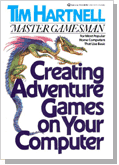
(I found this reference in an excellent post by Michael Fogus)
Early Christmas present
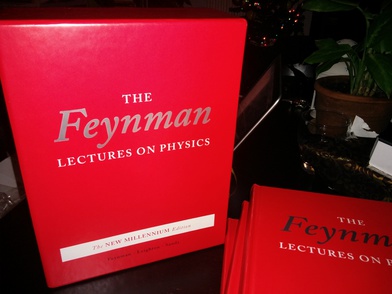
The only way to beat this would be giving me more time to read it. (It's a wonderful boxed-set edition of the famous Feynman Lectures on Physics)
Urania 1622
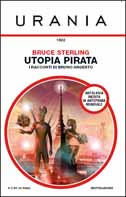
I'm told that Bruce Sterling now lives in Italy, in Turin. This is a collection of stories set around Italy. Just skimmed the very first pages so far, I noticed an overflow of the word "occult".
Anathem, by Neal Stephenson
I'm currently approximately 5% through the novel. I still have only faint ideas about what's going on. Not yet alarming, by my count.
The Little Prover
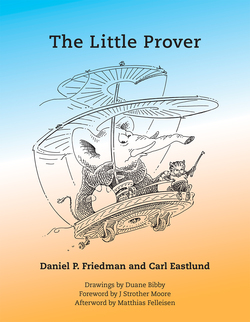
Just arrived. It's printed in colours!
I didn't have the courage to ask the courier about two more books I'm waiting for: he seemed very pissed off for the problems he had finding my address.
Measuring things
I use org-mode for registering the books I read. Here some code to produce stats.
;; Is there a better (more idiomatic) way to aggregate values? (defun aggregate (aggregate-function lst) (let ((hash (make-hash-table :test 'equal))) (loop for key in (mapcar 'car lst) for value in (mapcar 'cdr lst) do (if (null (gethash key hash)) (puthash key value hash) (puthash key (funcall aggregate-function value (gethash key hash)) hash)) finally return hash))) (defun pages-per-month-raw () (with-current-buffer (get-file-buffer "~/org/books.org") (mapcar (lambda (b) (let* ((month (format-time-string "%b" (date-to-time (cdr (assoc "TIMESTAMP" b))))) (pages (string-to-int (cdr (assoc "PAGES" b))))) (cons month pages))) (books/in-year "2015")))) (defun pages-per-month () (let ((ppmr (pages-per-month-raw))) (aggregate '+ ppmr))) (defun month-list () '("Jan" "Feb" "Mar" "Apr" "May" "Jun" "Jul" "Aug" "Sep" "Oct" "Nov" "Dec")) (defun complete-hash (hash) (let ((new-hash (make-hash-table))) (loop for month-name in (month-list) do (if (null (gethash month-name hash)) (puthash month-name 0 new-hash) (puthash month-name (gethash month-name hash) new-hash)) finally return new-hash))) ;; Poor man's TSV export ;; TODO check the implicit assertion on the ordering (maphash (lambda (k v) (insert (format "%s\t%s\n" k v))) (complete-hash (pages-per-month)))
Then, for example:
stats <- read.csv("/tmp/stats.tsv", sep = "\t", header = F)
names(stats) <- c("month", "pages")
stats$month <- factor(stats$month, month.name )
p <- ggplot( stats, aes(month, pages)) +
geom_histogram() +
theme(axis.text.x = element_text(angle=45, hjust=1))
p
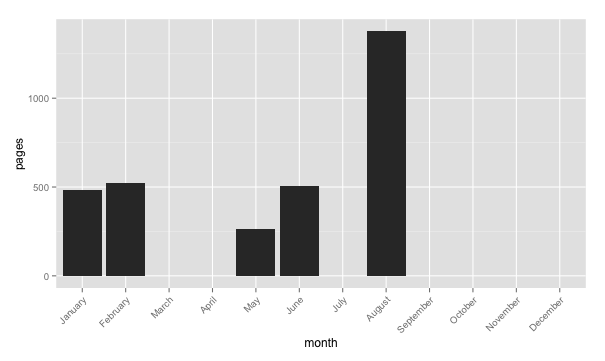
2011 in books
Essays/Computer science/$work stuff
- Programming Pig
- Hadoop The definitive guide
- Cassandra: The definitive guide
- Data Analysis with Open Source Tools
In 2011 I started my adventures in the perilous lands of bigdata, so I've begun harvesting literature on the subject. Extremely interesting and relatively young field. I have an almost finished review of "Data Analysis with Open Source Tools" which I hope to publish soon.
Novels
My first encounter with Douglas Coupland. I particularly liked Microserfs, that somehow seemed to be speaking directly to me. Perhaps not for everybody.
Five minutes after Games of Thrones s01e01 I realized I couldn't wait an entire week to know the rest of the story. Still entertaining, after ~3000 pages and already in the fourth book.
I'm a hardcore Neal Stephenson fan. I also have Anathem in my stack, but I decided to read Reamde first, because it seemed less dense. It was, and also more fast-paced than usual.

